- Home
- Ian Fleming
Bond 02 - Live and Let Die Page 2
Bond 02 - Live and Let Die Read online
Page 2
They sat down and ate steadily through each delicious course of American cooking at its rare best.
They said little, and it was only when the coffee had been brought and the table cleared away that Captain Dexter took the fifty-cent cigar from his mouth and cleared his throat decisively.
‘Mr Bond,’ he said, ‘now perhaps you would tell us what you know about this case.’
Bond slit open a fresh pack of King Size Chesterfields with his thumb-nail and, as he settled back in his comfortable chair in the warm luxurious room, his mind went back two weeks to the bitter raw day in early January when he had walked out of his Chelsea flat into the dreary half-light of a London fog.
1 This terrifying gambling case is described in the author’s Casino Royale.
2 ....... INTERVIEW WITH M.
THE GREY Bentley convertible, the 1933 4½-litre with the Amherst-Villiers supercharger, had been brought round a few minutes earlier from the garage where he kept it and the engine had kicked directly he pressed the self-starter. He had turned on the twin fog lights and had driven gingerly along King’s Road and then up Sloane Street into Hyde Park.
M.’s Chief of Staff had telephoned at midnight to say that M. wanted to see Bond at nine the next morning. ‘Bit early in the day,’ he had apologized, ‘but he seems to want some action from somebody. Been brooding for weeks. Suppose he’s made up his mind at last.’
‘Any line you can give me over the telephone?’
‘A for Apple and C for Charlie,’ said the Chief of Staff, and rang off.
That meant that the case concerned Stations A and C, the sections of the Secret Service dealing respectively with the United States and the Caribbean. Bond had worked for a time under Station A during the war, but he knew little of C or its problems.
As he crawled beside the kerb up through Hyde Park, the slow drumbeat of his two-inch exhaust keeping him company, he felt excited at the prospect of his interview with M., the remarkable man who was then, and still is, head of the Secret Service. He had not looked into those cold, shrewd eyes since the end of the summer. On that occasion M. had been pleased.
‘Take some leave,’ he had said. ‘Plenty of leave. Then get some new skin grafted over the back of that hand. “Q” will put you on to the best man and fix a date. Can’t have you going round with that damn Russian trade-mark on you. See if I can find you a good target when you’ve got cleaned up. Good luck.’
The hand had been fixed, painlessly but slowly. The thin scars, the single Russian letter which stands for SCH, the first letter of Spion, a spy, had been removed and as Bond thought of the man with the stiletto who had cut them he clenched his hands on the wheel.
What was happening to the brilliant organization of which the man with the knife had been an agent, the Soviet organ of vengeance, SMERSH, short for Smyert Spionam – Death to Spies? Was it still as powerful, still as efficient? Who controlled it now that Beria was gone? After the great gambling case in which he had been involved at Royale-les-Eaux, Bond had sworn to get back at them. He had told M. as much at that last interview. Was this appointment with M. to start him on his trail of revenge?
Bond’s eyes narrowed as he gazed into the murk of Regents Park and his face in the faint dashlight was cruel and hard.
He drew up in the mews behind the gaunt high building, handed his car over to one of the plain-clothes drivers from the pool and walked round to the main entrance. He was taken up in the lift to the top floor and along the thickly carpeted corridor he knew so well to the door next to M.’s. The Chief of Staff was waiting for him and at once spoke to M. on the intercom.
‘007’s here now, Sir.’
‘Send him in.’
The desirable Miss Moneypenny, M.’s all-powerful private secretary, gave him an encouraging smile and he walked through the double doors. At once the green light came on, high on the wall in the room he had left. M. was not to be disturbed as long as it burned.
A reading lamp with a green glass shade made a pool of light across the red leather top of the broad desk. The rest of the room was darkened by the fog outside the windows.
‘Morning, 007. Let’s have a look at the hand. Not a bad job. Where did they take the skin from?’
‘High up on the forearm, Sir.’
‘Hm. Hairs’ll grow a bit thick. Crooked too. However. Can’t be helped. Looks all right for the time being. Sit down.’
Bond walked round to the single chair which faced M. across the desk. The grey eyes looked at him, through him.
‘Had a good rest?’
‘Yes thank you, Sir.’
‘Ever seen one of these?’ M. abruptly fished something out of his waistcoat pocket. He tossed it halfway across the desk towards Bond. It fell with a faint clang on the red leather and lay, gleaming richly, an inch-wide, hammered gold coin.
Bond picked it up, turned it over, weighed it in his hand.
‘No, Sir. Worth about five pounds, perhaps.’
‘Fifteen to a collector. It’s a Rose Noble of Edward IV.’
M. fished again in his waistcoat pocket and tossed more magnificent gold coins on to the table in front of Bond. As he did so, he glanced at each one and identified it.
‘Double Excellente, Spanish, Ferdinand and Isabella, 1510; Ecu au Soleil, French, Charles IX, 1574; Double Ecu d’or, French, Henry IV, 1600; Double Ducat, Spanish, Philip II, 1560; Ryder, Dutch, Charles d’Egmond, 1538; Quadruple, Genoa, 1617; Double louis, à la mèche courte, French, Louis XIV, 1644. Worth a lot of money melted down. Much more to collectors, ten to twenty pounds each. Notice anything common to them all?’
Bond reflected. ‘No, Sir.’
‘All minted before 1650. Bloody Morgan, the pirate, was Governor and Commander-in-Chief of Jamaica from 1674 to 1683. The English coin is the joker in the pack. Probably shipped out to pay the Jamaica garrison. But for that and the dates, these could have come from any other treasure-trove put together by the great pirates – L’Ollonais, Pierre le Grand, Sharp, Sawkins, Blackbeard. As it is, and both Spinks and the British Museum agree, this is almost certainly part of Bloody Morgan’s treasure.’
M. paused to fill his pipe and light it. He didn’t invite Bond to smoke and Bond would not have thought of doing so uninvited.
‘And the hell of a treasure it must be. So far nearly a thousand of these and similar coins have turned up in the United States in the last few months. And if the Special Branch of the Treasury, and the F.B.I., have traced a thousand, how many more have been melted down or disappeared into private collections? And they keep on coming in, turning up in banks, bullion merchants, curio shops, but mostly pawnbrokers of course. The F.B.I. are in a proper fix. If they put these on the police notices of stolen property they know the source will dry up. They’d be melted down into gold bars and channelled straight into the black bullion market. Have to sacrifice the rarity value of the coins, but the gold would go straight underground. As it is, someone’s using the negroes – porters, sleeping-car attendants, truck-drivers – and getting the money well spread over the States. Quite innocent people. Here’s a typical case.’ M. opened a brown folder bearing the Top Secret red star and selected a single sheet of paper. Through the reverse side, as M. held it up, Bond could see the engraved heading: ‘Department of Justice. Federal Bureau of Investigations.’ M. read from it:
‘Zachary Smith, 35, Negro, Member of the Sleeping Car Porters Brotherhood, address 90b West 126th Street, New York City.’ (M. looked up: ‘Harlem,’ he said.) ‘Subject was identified by Arthur Fein of Fein Jewels Inc., 870 Lenox Avenue, as having offered for sale on November 21st last four gold coins of the sixteenth and seventeenth century (details attached). Fein offered a hundred dollars which was accepted. Interrogated later, Smith said they had been sold to him in Seventh Heaven Bar-B-Q (a well-known Harlem bar) for twenty dollars each by a negro he had never seen before or since. Vendor had said they were worth fifty dollars each at Tiffany’s, but that he, the vendor, wanted ready cash and Tiffany’s was too
far anyway. Smith bought one for twenty dollars and on finding that a neighbouring pawnbroker would offer him twenty-five dollars for it, returned to the bar and purchased the remaining three for sixty dollars. The next morning he took them to Fein’s. Subject has no criminal record.’
M. returned the paper to the brown folder.
‘That’s typical,’ he said. ‘Several times they’ve caught up with the next link, the middle man who bought them a bit cheaper and they find that he bought a handful, in one case a hundred of them, from some man who presumably got them cheaper still. All these larger transactions have taken place in Harlem or Florida. Always the next man in the link was an unknown negro, in all cases a white-collar man, prosperous, educated, who said he guessed they were treasure-trove, Blackbeard’s treasure.
‘This Blackbeard story would stand up to most investigations,’ continued M., ‘because there is reason to believe that part of his hoard was dug up around Christmas Day, 1928, at a place called Plum Point. It’s a narrow neck of land in Beaufort County, North Carolina, where a stream called Bath Creek flows into the Pamlico River. Don’t think I’m an expert,’ he smiled, ‘you can read all about this in the dossier. So, in theory, it would be quite reasonable for those lucky treasure-hunters to have hidden the loot until everyone had forgotten the story and then thrown it fast on the market. Or else they could have sold it en bloc at the time, or later, and the purchaser has just decided to cash in. Anyway it’s a good enough cover except on two counts.’
M paused and relit his pipe.
‘Firstly, Blackbeard operated from about 1690 to 1710 and it’s improbable that none of his coin should have been minted later than 1650. Also, as I said before, it’s very unlikely that his treasure would contain Edward IV Rose Nobles, since there’s no record of an English treasure-ship being captured on its way to Jamaica. The Brethren of the Coast wouldn’t take them on. Too heavily escorted. There were much easier pickings if you were sailing in those days “on the plundering account“ as they called it.
‘Secondly,’ and M. looked at the ceiling and then back at Bond, ‘I know where the treasure is. At least I’m pretty sure I do. And it’s not in America. It’s in Jamaica, and it is Bloody Morgan’s, and I guess it’s one of the most valuable treasure-troves in history.’
‘Good Lord,’ said Bond. ‘How … where do we come into it?’
M. held up his hand. ‘You’ll find all the details in here,’ he let his hand come down on the brown folder. ‘Briefly, Station C has been interested in a Diesel yacht, the Secatur, which has been running from a small island on the North Coast of Jamaica through the Florida Keys into the Gulf of Mexico, to a place called St Petersburg. Sort of pleasure resort, near Tampa. West Coast of Florida. With the help of the F.B.I. we’ve traced the ownership of this boat and of the island to a man called Mr Big, a negro gangster. Lives in Harlem. Ever heard of him?’
‘No,’ said Bond.
‘And curiously enough,’ M.’s voice was softer and quieter, ‘a twenty-dollar bill which one of these casual negroes had paid for a gold coin and whose number he had noted for Peaka Peow, the Numbers game, was paid out by one of Mr Big’s lieutenants. And it was paid,’ M. pointed the stem of his pipe at Bond, ‘for information received, to an F.B.I. double-agent who is a member of the Communist Party.’
Bond whistled softly.
‘In short,’ continued M., ‘we suspect that this Jamaican treasure is being used to finance the Soviet espionage system, or an important part of it, in America. And our suspicion becomes a certainty when I tell you who this Mr Big is.’
Bond waited, his eyes fixed on M.’s.
‘Mr Big,’ said M., weighing his words, ‘is probably the most powerful negro criminal in the world. He is,’ and he enumerated carefully, ‘the head of the Black Widow Voodoo cult and believed by that cult to be the Baron Samedi himself. (You’ll find all about that here,’ he tapped the folder, ‘and it’ll frighten the daylights out of you.) He is also a Soviet agent. And finally he is, and this will particularly interest you, Bond, a known member of SMERSH.’
‘Yes,’ said Bond slowly, ‘I see now.’
‘Quite a case,’ said M., looking keenly at him. ‘And quite a man, this Mr Big.’
‘I don’t think I’ve ever heard of a great negro criminal before,’ said Bond, ‘Chinamen, of course, the men behind the opium trade. There’ve been some big-time Japs, mostly in pearls and drugs. Plenty of negroes mixed up in diamonds and gold in Africa, but always in a small way. They don’t seem to take to big business. Pretty law-abiding chaps I should have thought except when they’ve drunk too much.’
‘Our man’s a bit of an exception,’ said M. ‘He’s not pure negro. Born in Haiti. Good dose of French blood. Trained in Moscow, too, as you’ll see from the file. And the negro races are just beginning to throw up geniuses in all the professions – scientists, doctors, writers. It’s about time they turned out a great criminal. After all, there are 250,000,000 of them in the world. Nearly a third of the white population. They’ve got plenty of brains and ability and guts. And now Moscow’s taught one of them the technique.’
‘I’d like to meet him,’ said Bond. Then he added, mildly, ‘I’d like to meet any member of SMERSH.’
‘All right then, Bond. Take it away.’ M. handed him the thick brown folder. ‘Talk it over with Plender and Damon. Be ready to start in a week. It’s a joint C.I.A. and F.B.I. job. For God’s sake don’t step on the F.B.I.’s toes. Covered with corns. Good luck.’
Bond had gone straight down to Commander Damon, Head of Station A, an alert Canadian who controlled the link with the Central Intelligence Agency, America’s Secret Service.
Damon looked up from his desk. ‘I see you’ve bought it,’ he said, looking at the folder. ‘Thought you would. Sit down,’ he waved to an armchair beside the electric fire. ‘When you’ve waded through it all, I’ll fill in the gaps.’
3 ....... A VISITING CARD
AND NOW it was ten days later and the talk with Dexter and Leiter had not added much, reflected Bond as he awoke slowly and luxuriously in his bedroom at the St Regis the morning after his arrival in New York.
Dexter had had plenty of detail on Mr Big, but nothing that threw any new light on the case. Mr Big was forty-five years old, born in Haiti, half negro and half French. Because of the initial letters of his fanciful name, Buonaparte Ignace Gallia, and because of his huge height and bulk, he came to be called, even as a youth, ‘Big Boy’ or just ‘Big’. Later this became ‘The Big Man’ or ‘Mr Big’, and his real names lingered only on a parish register in Haiti and on his dossier with the F.B.I. He had no known vices except women, whom he consumed in quantities. He didn’t drink or smoke and his only Achilles heel appeared to be a chronic heart disease which had, in recent years, imparted a greyish tinge to his skin.
The Big Boy had been initiated into Voodoo as a child, earned his living as a truck-driver in Port au Prince, then emigrated to America and worked successfully for a hijacking team in the Legs Diamond gang. With the end of Prohibition he had moved to Harlem and bought half-shares in a small nightclub and a string of coloured call-girls. His partner was found in a barrel of cement in the Harlem River in 1938 and Mr Big automatically became sole proprietor of the business. He was called up in 1943 and, because of his excellent French, came to the notice of the Office of Strategic Services, the wartime secret service of America, who trained him with great thoroughness and put him into Marseilles as an agent against the Pétain collaborationists. He merged easily with African negro dock-hands, and worked well, providing good and accurate naval intelligence. He operated closely with a Soviet spy who was doing a similar job for the Russians. At the end of the war he was demobilized in France (and decorated by the Americans and the French) and then he disappeared for five years, probably to Moscow. He returned to Harlem in 1950 and soon came to the notice of the F.B.I. as a suspected Soviet agent. But he never incriminated himself or fell into any of the traps laid by the F.B.I. He bought up
three nightclubs and a prosperous chain of Harlem brothels. He seemed to have unlimited funds and paid all his lieutenants a flat rate of twenty thousand dollars a year. Accordingly, and as a result of weeding by murder, he was expertly and diligently served. He was known to have originated an underground Voodoo temple in Harlem and to have established a link between it and the main cult in Haiti. The rumour had started that he was the Zombie or living corpse of Baron Samedi himself, the dreaded Prince of Darkness, and he fostered the story so that now it was accepted through all the lower strata of the negro world. As a result, he commanded real fear, strongly substantiated by the immediate and often mysterious deaths of anyone who crossed him or disobeyed his orders.
Bond had questioned Dexter and Leiter very closely on the evidence connecting the giant negro with SMERSH. It certainly seemed conclusive.
In 1951, by the promise of one million dollars in gold and a safe refuge after six months’ work for them, the F.B.I. had at last persuaded a known Soviet agent of the M.W.D. to turn double. All went well for a month and the results exceeded the highest expectations. The Russian spy held the appointment of an economic expert on the Soviet delegation to the United Nations. One Saturday, he had gone to take the subway to Pennsylvania Station en route for the Soviet week-end rest camp at Glen Cove, the former Morgan estate on Long Island.
A huge negro, positively identified from photographs as The Big Man, had stood beside him on the platform as the train came in and was seen walking towards the exit even before the first coach had come to a standstill over the bloody vestiges of the Russian. He had not been seen to push the man, but in the crowd it would not have been difficult. Spectators said it could not have been suicide. The man screamed horribly as he fell and he had had (melancholy touch!) a bag of golf clubs over his shoulder. The Big Man, of course, had had an alibi as solid as Fort Knox. He had been held and questioned, but was quickly sprung by the best lawyer in Harlem.

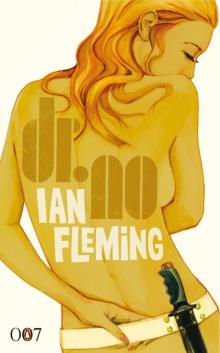 Doctor No
Doctor No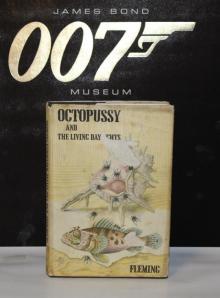 Octopussy & the Living Daylights
Octopussy & the Living Daylights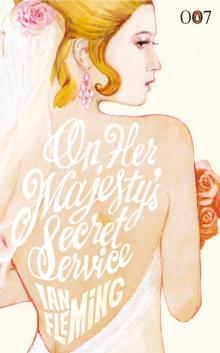 On Her Majestys Secret Service
On Her Majestys Secret Service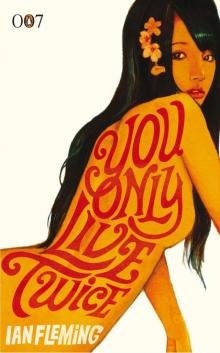 You Only Live Twice
You Only Live Twice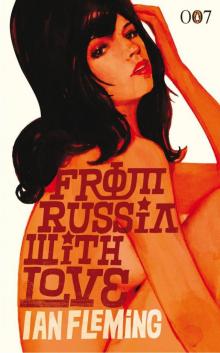 From Russia With Love
From Russia With Love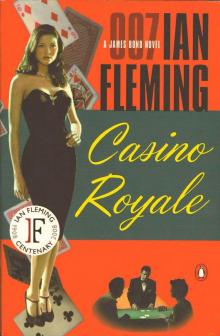 Casino Royale
Casino Royale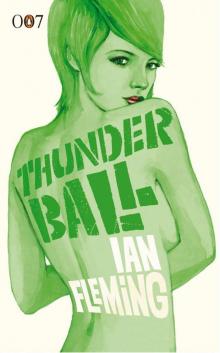 Thunderball
Thunderball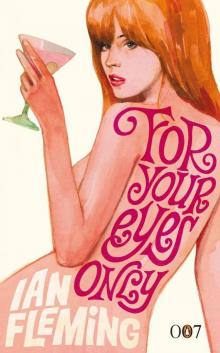 For Your Eyes Only
For Your Eyes Only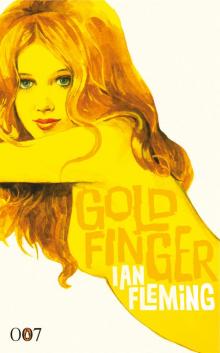 Goldfinger
Goldfinger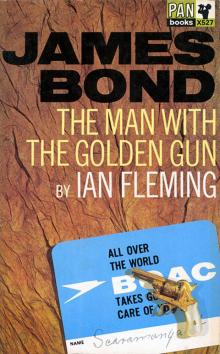 The Man With the Golden Gun
The Man With the Golden Gun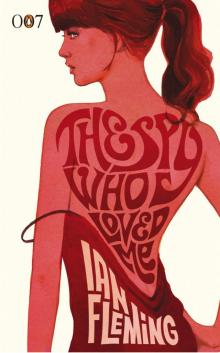 The Spy Who Loved Me
The Spy Who Loved Me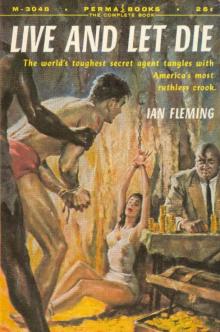 Live and Let Die
Live and Let Die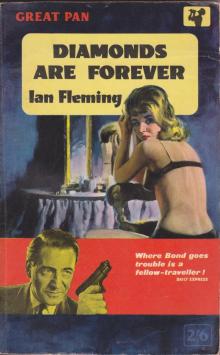 Diamonds Are Forever
Diamonds Are Forever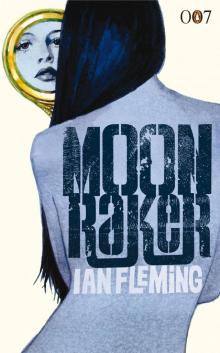 Moonraker
Moonraker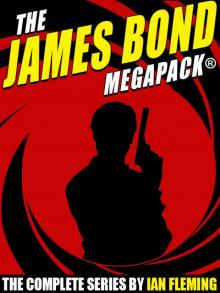 The James Bond MEGAPACK®
The James Bond MEGAPACK®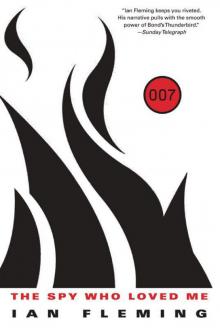 Bond 10 - The Spy Who Loved Me
Bond 10 - The Spy Who Loved Me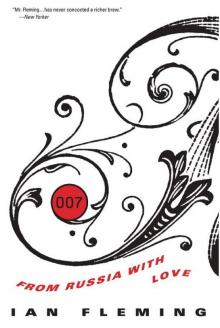 From Russia with Love (James Bond - Extended Series Book 5)
From Russia with Love (James Bond - Extended Series Book 5)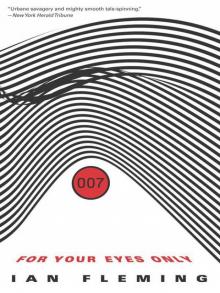 Bond 08 - For Your Eyes Only
Bond 08 - For Your Eyes Only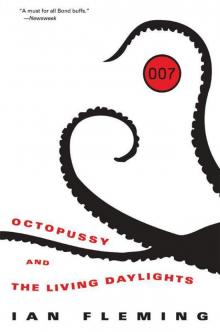 Bond 14 - Octopussy and the Living Daylights
Bond 14 - Octopussy and the Living Daylights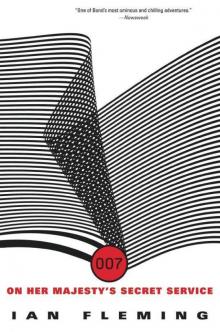 Bond 11 - On Her Majesty's Secret Service
Bond 11 - On Her Majesty's Secret Service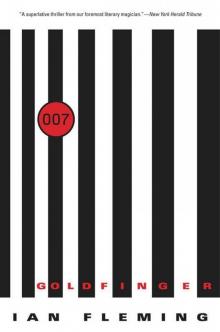 Bond 07 - Goldfinger
Bond 07 - Goldfinger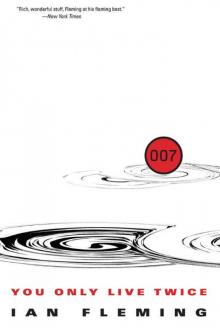 Bond 12 - You Only Live Twice
Bond 12 - You Only Live Twice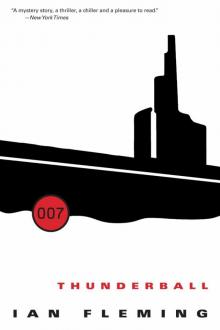 Bond 09 - Thunderball
Bond 09 - Thunderball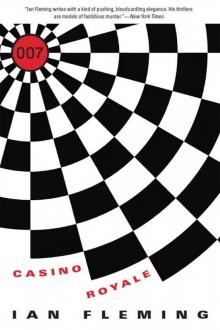 Bond 01 - Casino Royale
Bond 01 - Casino Royale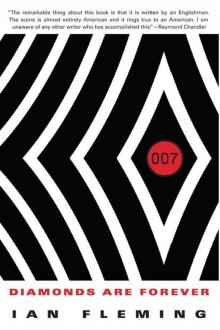 Diamonds are Forever (James Bond - Extended Series Book 4)
Diamonds are Forever (James Bond - Extended Series Book 4)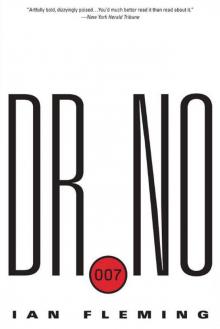 Bond 06 - Dr. No
Bond 06 - Dr. No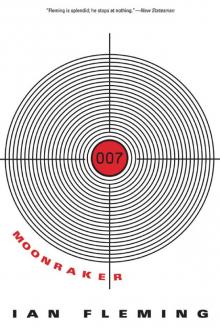 Moonraker (James Bond - Extended Series Book 3)
Moonraker (James Bond - Extended Series Book 3)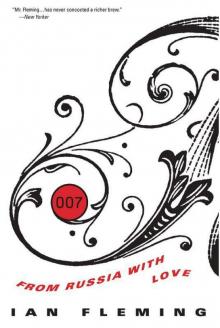 Bond 05 - From Russia With Love
Bond 05 - From Russia With Love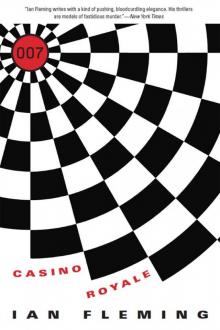 Casino Royale (James Bond - Extended Series Book 1)
Casino Royale (James Bond - Extended Series Book 1)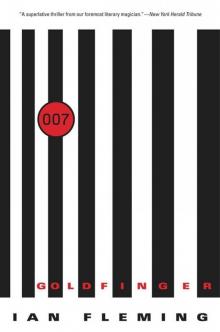 Goldfinger (James Bond - Extended Series Book 7)
Goldfinger (James Bond - Extended Series Book 7)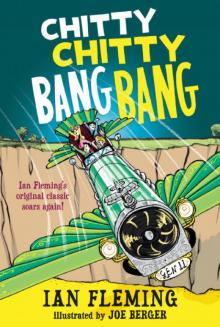 Chitty Chitty Bang Bang: The Magical Car
Chitty Chitty Bang Bang: The Magical Car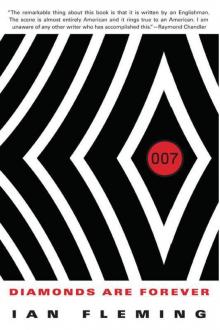 Bond 04 - Diamonds Are Forever
Bond 04 - Diamonds Are Forever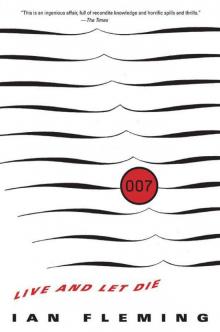 Bond 02 - Live and Let Die
Bond 02 - Live and Let Die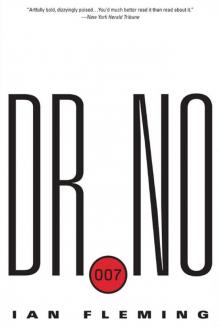 Dr. No (James Bond - Extended Series Book 6)
Dr. No (James Bond - Extended Series Book 6) The Hildebrandt rarity
The Hildebrandt rarity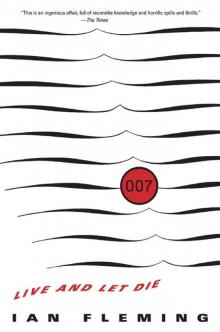 Live and Let Die (James Bond - Extended Series Book 2)
Live and Let Die (James Bond - Extended Series Book 2)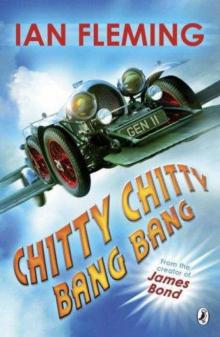 Chitty Chitty Bang Bang
Chitty Chitty Bang Bang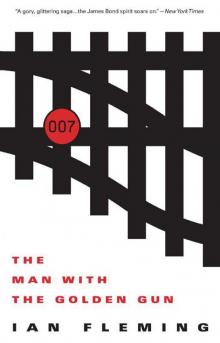 Bond 13 - The Man With the Golden Gun
Bond 13 - The Man With the Golden Gun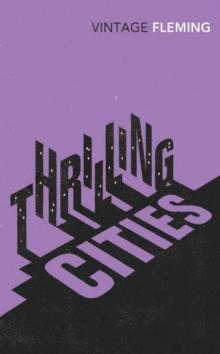 Thrilling Cities
Thrilling Cities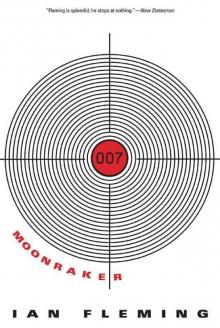 Bond 03 - Moonraker
Bond 03 - Moonraker